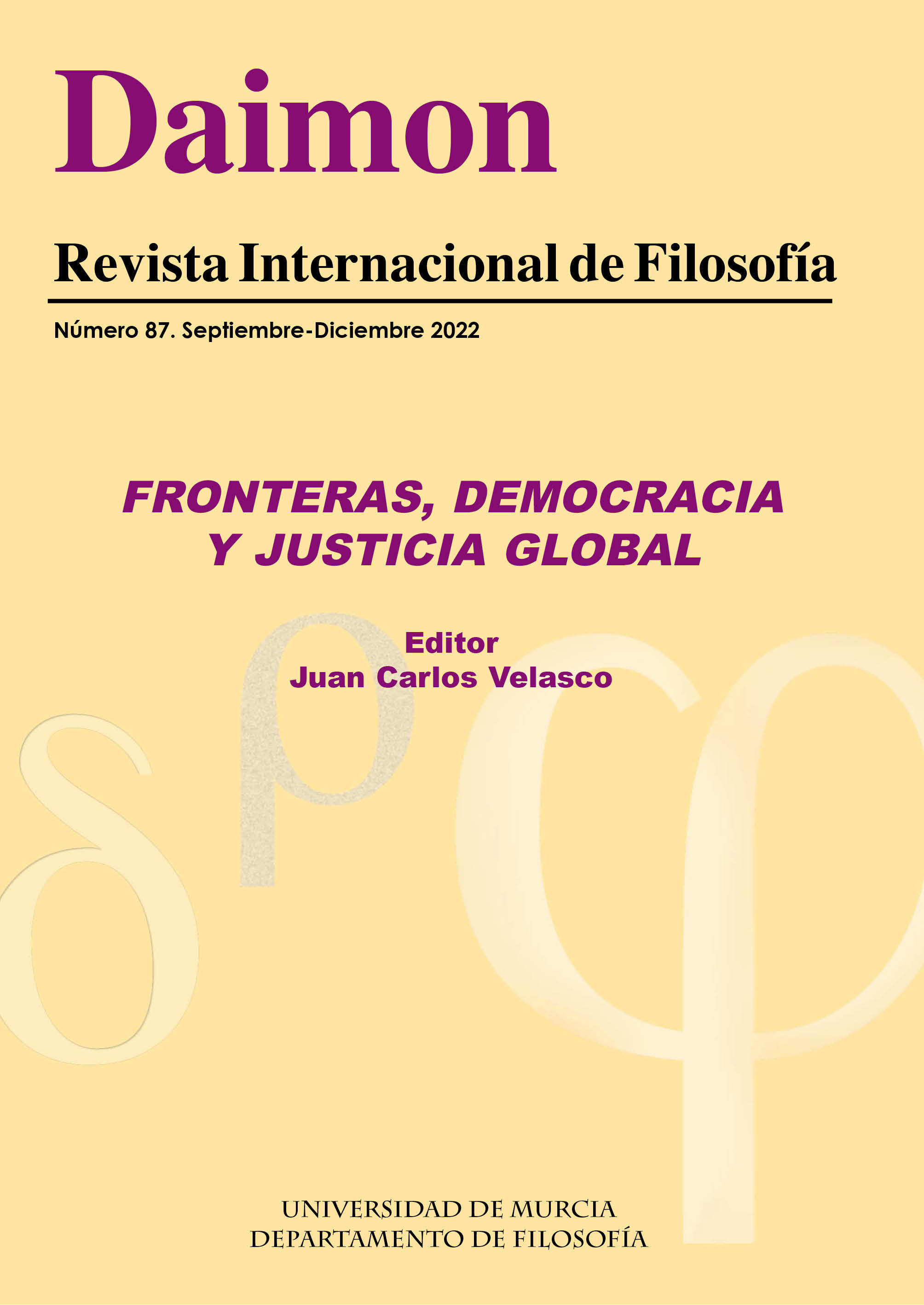Talent-permeable Borders: Qualified International Mobility from the Global South and Cosmopolitan Egalitarianism
Abstract
Free international mobility is one of cosmopolitan egalitarianism’s classical political goals. Yet, nowadays, borders’ impact on people’s opportunities on a global scale does not solely arise from their mechanisms of exclusion, but also from their permeability to certain forms of migration. This article analyses the implications of skilled emigration for productive justice, and argues that, in some circumstances, cosmopolitan egalitarians should support restrictions to freedom of movement to articulate a defence of that basic right that is more coherent with its different normative commitments.
Downloads
-
Abstract687
-
PDF (Español (España))342
-
HTML (Español (España))145
References
Abizadeh, A. (2016). The Special-Obligations Challenge to More Open Borders. En S. Fine & L. Ypi (Eds.), Migration in Political Theory. The Ethics of Movement and Membership (105-124). Oxford University Press.
Anderson, E. (1999). What is the Point of Equality? Ethics, 109(2), 287-337.
Blake, M. (2015a). The Right to Leave and What Remains. En G. Brock & M. Blake (Eds.), Debating Brain Drain. May Governments Restrict Migration? (190-233). Oxford University Press.
Blake, M. (2015b). The Right to Leave: Looking Back. En G. Brock & M. Blake (Eds.), Debating Brain Drain. May Governments Restrict Migration? (111-154). Oxford University Press.
Bloom, T. (2009). Just open borders? Examining Joseph Carens’ open borders argument in the light of a case study of recent Somali migrants to the UK. Journal of Global Ethics, 5(3), 231-243. https://doi.org/10.1080/17449620903403325
Brock, G. (2015a). Brock Responds to Blake. En G. Brock & M. Blake (Eds.), Debating Brain Drain: May Governments Restrict Emigration? (237-285). Oxford University Press.
Brock, G. (2015b). Prosperity in Developing Countries, the Effects Departing Individuals Have on Those Left Behind, and Some Policy Options. En G. Brock & M. Blake (Eds.), Debating Brain Drain: May Governments Restrict Emigration? (36-59). Oxford University Press.
Carens, J. H. (1987). Aliens and Citizens: The Case for Open Borders. Review of Politics, 49(2), 251-273.
Carens, J. H. (2013). The Ethics of Immigration. Oxford University Press.
Carens, J. H. (2016). Expanding the Brain Drain Debate. Law, Ethics and Philosophy, 4, 132-145.
Cavallero, E. (2006). An immigration-pressure model of global distributive justice. Politics, Philosophy & Economics, 5(1), 97-127. https://doi.org/10.1177/1470594X06060621
Cohen, G. A. (2008). Rescuing Justice and Equality. Harvard University Press.
Jones, A. M. (2008). Staff shortages and immigration in the financial services sector. En A Need for Migrant Labour? Report prepared by COMPAS. Home Office.
Kapur, D., & McHale, J. (2006). Should a Cosmopolitan Worry about the «Brain Drain»? Ethics & International Affairs, 20(3), 305-320.
Loewe, D. (2019). Common Ownership of the Earth and Immigration: Human Mobility in a Kantian Perspective. En M. La Barbera & J. C. Velasco (Eds.), Challenging the Borders of Justice in the Age of Migrations (57-71). Springer.
Mau, S. (2020). Borders that stay, move, and expand. En A. Shachar (Ed.), The shifting border: Legal cartographies of migration and mobility: Ayelet Shachar in dialogue (139-157). Manchester University Press.
Mau, S., Gülzau, F., Laube, L., & Zaun, N. (2015). The Global Mobility Divide: How Visa Policies Have Evolved over Time. Journal of Ethnic and Migration Studies, 41(8), 1192-1213.
Mezzadra, S., & Neilson, B. (2017). La frontera como método. Traficantes de Sueños.
Milanovic, B. (2016). Global Inequality. The Belknap Press of Harvard University Press.
Oberman, K. (2013). Can Brain Drain Justify Immigration Restrictions? https://doi.org/10.2139/ssrn.2164893
Otsuka, M. (2008). Freedom of Occupational Choice. Ratio, 21(4), 440-453. https://doi.org/10.1111/j.1467-9329.2008.00412.x
Piketty, T. (2015). El capital en el siglo XXI (F. J. Ramos & A. Escartín Arilla, Trads.). RBA.
Rawls, J. (1999). A Theory of Justice. Revised Edition. Harvard University Press.
Shachar, A. (2006). The Race for Talent: Highly Skilled Migrants and Competitive Immigration Regimes. New York University Law Review, 81, 148-206.
Shachar, A. (2009). The Birthright Lottery. Citizenship and Global Inequality. Harvard University Press.
Shachar, A. (2016). Selectin by Merit. The Brave New World of Stratified Mobility. En S. Fine & L. Ypi (Eds.), Migration in Political Theory. The Ethics of Movement and Membership (175-201). Oxford University Press.
Stanczyk, L. (2012). Productive Justice. Philosophy & Public Affairs, 40(2), 144-164. https://doi.org/10.1111/j.1088-4963.2012.01212.x
Stanczyk, L. (2016). Managing skilled migration. Ethics & Global Politics, 9(1), 1-11. https://doi.org/10.3402/egp.v9.33502
Temkin, L. S. (2003). Egalitarianism Defended. Ethics, 113(4), 764-782. https://doi.org/10.1086/373955
Turégano, I. (2019). Ethical Dimensions of Migration Policies: A Critical Cosmopolitan Perspective. En J. C. Velasco & M. La Barbera (Eds.), Challenging the Borders of Justice in the Age of Migrations (95-116). Springer.
Velasco, J. C. (2016). El azar de las fronteras. Políticas migratorias, ciudadanía y justicia. Fondo de Cultura Económica. https://doi.org/10.13039/501100010198
Velasco, J. C. (2020). Hacia una visión cosmopolita de las fronteras. Desigualdades y migraciones desde la perspectiva de la justicia global. Revista Internacional de Sociología, 78(2), e153-e153.
Copyright (c) 2022 Daimon Revista Internacional de Filosofia

This work is licensed under a Creative Commons Attribution-NonCommercial-NoDerivatives 3.0 Unported License.
Las obras que se publican en esta revista están sujetas a los siguientes términos:
1. El Servicio de Publicaciones de la Universidad de Murcia (la editorial) conserva los derechos patrimoniales (copyright) de las obras publicadas, y favorece y permite la reutilización de las mismas bajo la licencia de uso indicada en el punto 2.
2. Las obras se publican en la edición electrónica de la revista bajo una licencia Creative Commons Reconocimiento-NoComercial-SinObraDerivada 3.0 España (texto legal). Se pueden copiar, usar, difundir, transmitir y exponer públicamente, siempre que: i) se cite la autoría y la fuente original de su publicación (revista, editorial y URL de la obra); ii) no se usen para fines comerciales; iii) si remezcla, transforma o crea a partir del material, no podrá distribuir el material modificado.
3. Condiciones de auto-archivo. Se permite y se anima a los autores a difundir electrónicamente las versiones pre-print (versión antes de ser evaluada) y/o post-print (versión evaluada y aceptada para su publicación) de sus obras antes de su publicación, ya que favorece su circulación y difusión más temprana y con ello un posible aumento en su citación y alcance entre la comunidad académica. Color RoMEO: verde.











